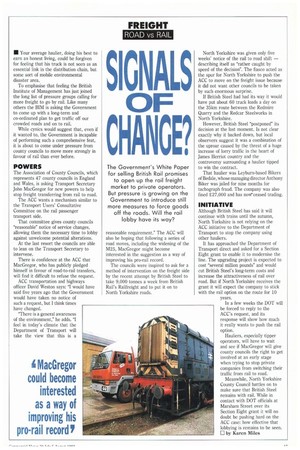SIGNALS
Page 19

If you've noticed an error in this article please click here to report it so we can fix it.
OF
CHANGE,
• Your average haulier, doing his best to earn an honest living, could be forgiven for feeling that his truck is not seen as an essential link in the distribution chain, but some sort of mobile environmental disaster area.
To emphasise that feeling the British Institute of Management has just joined the long list of pressure groups calling for more freight to go by rail. Like many others the BIM is asking the Government to come up with a long-term and co-ordinated plan to get traffic off our crowded roads and on to rail.
While cynics would suggest that, even if it wanted to, the Government is incapable of performing such a comprehensive feat, it is about to come under pressure from county councils to move more strongly in favour of rail than ever before.
The Association of County Councils, which represents 47 county councils in England and Wales, is asking Transport Secretary John MacGregor for new powers to help stop freight transferring from rail to road.
The ACC wants a mechanism similar to the Transport Users' Consultative Committee on the rail passenger transport side.
That committee gives county councils "reasonable" notice of service changes, allowing them the necessary time to lobby against unwelcome potential alterations.
At the last resort the councils are able to lean on the Transport Secretary to intervene.
There is confidence at the ACC that MacGregor, who has publicly pledged himself in favour of road-to-rail transfers, will find it difficult to refuse the request.
ACC transportation and highways officer David Weston says: "I would have said five years ago that the Government would have taken no notice of such a request, but I think times have changed.
"There is a genera/ awareness of the environment," he adds. "I feel in today's climate that the Department of Transport will take the view that this is a reasonable requirement." The ACC will also be hoping that following a series of road moves, including the widening of the M25, MacGregor might become interested in the suggestion as a way of improving his pro-rail record.
The councils were inspired to ask for a method of intervention on the freight side by the recent attempt by British Steel to take 9,000 tonnes a week from British Rail's Rai[freight and to put it on to North Yorkshire roads. North Yorkshire was given only five weeks' notice of the rail to road shift — describing itself as "rather caught by speed of the decision". The fiasco acted as the spur for North Yorkshire to push the ACC to move on the freight issue because it did not want other councils to be taken by such enormous surprise.
If British Steel had had its way it would have put about 60 truck loads a day on the 35km route between the Redmire Quarry and the Redcar Steelworks in North Yorkshire.
However, British Steel "postponed" its decision at the last moment. Is not clear exactly why it backed down, but local observers suggest it was a combination of the uproar caused by the threat of a huge increase of lorry traffic in the heart of James Herriot country and the controversy surrounding a haulier tipped to win the contract.
That haulier was Leyburn-based Bikers of Bedale, whose managing director Anthony Biker was jailed for nine months for tachograph fraud. The company was also fined £27,000 and has novrceased trading.
Although British Steel has said it will continue with trains until the autumn, North Yorkshire is not relying on the ACC initiative to the Department of Transport to stop the company using other hauliers.
It has approached the Department of Transport direct and asked for a Section Eight grant to enable it to modernise the line. The upgrading project is expected to cost "several million pounds" and would cut British Steel's long-term costs and increase the attractiveness of rail over road. But if North Yorkshire receives the grant it will expect the company to stick with the rail option on the route for 10 years.
In a few weeks the DOT will be forced to reply to the ACC's request, and its response will show how much it really wants to push the rail option.
Hauliers, especially tipper operators, will have to wait and see if MacGregor will give county councils the right to get involved at an early stage when trying to stop private companies from switching their traffic from rail to road.
Meanwhile, North Yorkshire County Council battles on to make sure that British Steel remains with rail. While in contact with DOT officials at Marsham Street over its Section Eight grant it will no doubt be pushing hard on the ACC case: how effective that lobbying is remains to be seen. 0 by Karen Miles












































































